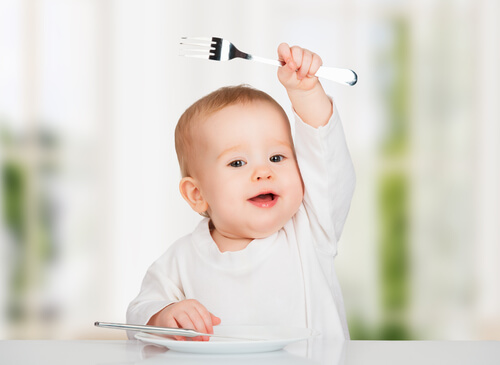What to Do If Your Baby Chokes while Eating or Drinking

First and foremost, you need to stay calm when something gets stuck in our little one’s throat. In most cases, babies are able to recover on their own almost immediately.
While the reaction of many parents is to blow onto their child’s face, this is not a recommended method. When doing so, you cause the child to stop breathing by reflex, which will make it hard for him or her to recover.
Why do babies choke?
During lactation, especially during the first 6 months, children can often get choked up on milk. In general, babies suckle with a great deal of energy and enthusiasm, which increases milk flow. This is true whether the baby is nursing or drinking from a bottle.
Therefore, it’s important to try to control the dosage of milk your little one receives. This is easier to do with a baby bottle, since you can simply change to a different nipple.
As for nursing, the mother can extract a small amount of milk before breastfeeding. This reduces the flow of milk.
Another cause for choking in newborns has to do with stomach or gastrointestinal problems. When babies suffer from gastrointestinal reflux, the constant regurgitation of milk can often cause children to become choked up.
When children reach 6 months of age, they begin eating solid foods. During this new stage, it’s important to offer pieces that are neither too large or too hard, as this can be a choking hazard. And of course, you should never leave your child alone while he or she is eating.

What to do if your baby chokes while eating?
If your baby starts having difficulty while eating, it’s important to stay calm and analyze the problem. If your baby is nursing, then the issue is probably due to drinking too fast. In this case, you should sit your child up so that he or she can cough. More than likely, this will be enough for your baby to recover.
If the problem persists, you must place your baby face down. Rest your child’s chin in the space between your thumb and index finger and lower his or her head slightly.
The rest of your baby’s body should be more elevated than the head. In doing so, gravity itself will cause the liquid to come out, opening your little one’s airway.
“In most cases, babies are able to recover on their own almost immediately”
The following step involves hitting your child with the palm of your hand between the shoulder blades. You can apply this same measure when you believe your child is choking on food or another object.
If the crisis continues, then you should place your child on his or her back and press down on the center of his or her chest with your thumbs.
You should make sure at all times that your baby can breathe and that he or she doesn’t lose consciousness.
Observe the color of your baby’s lips, as a purple line around the lips indicates your little one can’t breathe. If this is the case, and your intervention doesn’t work, then you should call 911 immediately.

What are the possible consequences of choking?
The first thing that occurs if the previously mentioned methods don’t work, is that the baby loses consciousness. This occurs because of a lack of oxygen.
In this case, you must perform mouth to mouth in order to restore your child’s consciousness. It’s important to make sure that your child comes to, as this situation can be fatal.
While choking on food is always a possibility when it comes to little ones, you should do whatever possible to prevent this from happening. In the case of nursing babies, it’s best to sit your child up while breastfeeding. Your child should never be lying down flat.
If your baby is learning to eat, you should start with soft foods. These are easier for your child to smash and dissolve with the gums. Finally, be sure to offer water, which will help your little one swallow.
All cited sources were thoroughly reviewed by our team to ensure their quality, reliability, currency, and validity. The bibliography of this article was considered reliable and of academic or scientific accuracy.
- Topjian, A. A., Nadkarni, V. M., & Berg, R. A. (2009). Cardiopulmonary resuscitation in children. Current Opinion in Critical Care. https://doi.org/10.1097/MCC.0b013e32832931e1
- Cyr, C., Hagel, B. E., Pless, I. B., Scott, J. W., Yanchar, N. L., Zelman, M., … Warda, L. J. (2012). Preventing choking and suffocation in children. Paediatrics and Child Health. https://doi.org/10.1093/pch/17.2.91
- Sidell, D. R., Kim, I. A., Coker, T. R., Moreno, C., & Shapiro, N. L. (2013). Food choking hazards in children. International Journal of Pediatric Otorhinolaryngology. https://doi.org/10.1016/j.ijporl.2013.09.005
This text is provided for informational purposes only and does not replace consultation with a professional. If in doubt, consult your specialist.
